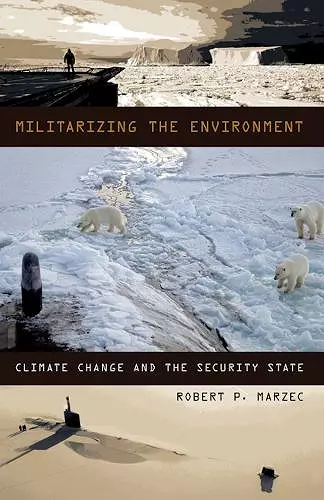Militarizing the Environment
Climate Change and the Security State
Format:Paperback
Publisher:University of Minnesota Press
Published:21st Dec '15
Currently unavailable, and unfortunately no date known when it will be back

As the seriousness of climate change becomes more and more obvious, military institutions are responding by taking a prominent role in the governing of environmental concerns, engaging in “climate change war games,” and preparing for the effects of climate change—from conflicts due to loss of food, water, and energy to the mass migration of millions of people displaced by rising sea levels. This combat-oriented stance stems from a self-destructive pattern of thought that Robert P. Marzec names “environmentality,” an attitude that has been affecting human–environmental relations since the seventeenth century.
Militarizing the Environment traces the rise of this influential mindset in America and other nations that threatens to supplant ideas of sustainability with demands for adaptation. In this extensive historical study of scientific, military, political, and economic formations across five centuries, Marzec reveals how environmentality has been instrumental in the development of today’s security society—informing the creation of the military-industrial complex during World War II and the National Security Act that established the CIA during the Cold War.
Now embedded in contemporary Western thought, environmentality has even infiltrated scientific thinking—transforming Darwinian insights into a quasi-theology that makes security the biological basis of existence. Marzec exposes the self-destructive nature of this increasingly accepted worldview and offers alternatives that counter the blind alleys of national and global security.
Militarizing the Environment: Climate Change and the Security State offers an illuminating, perturbing account of the greening of military discourse and strategy amidst an era of advancing climate change. Robert P. Marzec brilliantly details the neoliberal assault—at once militaristic, economic and discursive—on the commons and its most vulnerable inhabitants. His book is essential reading for anyone committed to understanding the new imperialism and its cynical, sinister appropriation of critical environmental ideas like resilience, adaptation, and sustainability.
—Rob Nixon, author of Slow Violence and the Environmentalism of the Poor
ISBN: 9780816697236
Dimensions: 216mm x 140mm x 38mm
Weight: unknown
320 pages